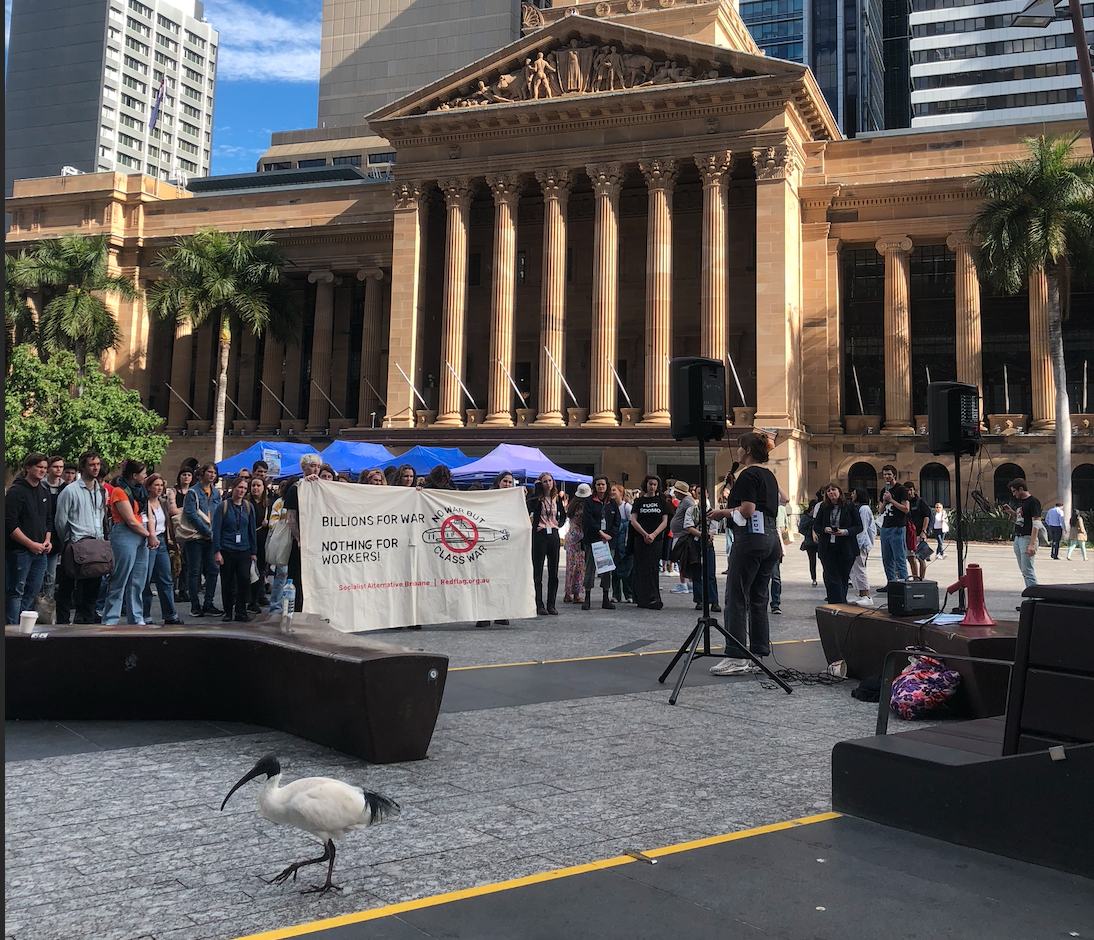Edcon is now behind us! Here’s a recap of the final day of Edcon 2023.
Housing with Max Chandler-Mather
Xavier Dupe, NUS Education Officer, opened the plenary, speaking on the housing crisis. “Tenants are being forced to bid against each other as landlords take advantage… This is a manufactured crisis.”
He also made Socialist Alternative’s take clear, “The beneficiaries of all of this are the rich… Labor has helped these rich parasites get even richer.”
Chandler-Mather presented on the ‘financialization of housing in Australia.’
He cited privatisation, secondary mortgage markets, the lifting of banking regulations, floating the dollar, and public housing cuts as historical drivers of the current housing crisis.
Chandler-Mather rejected that supply issues are the cause of the housing crisis. “By and large over the last thirty years the Australian housing market has oversupplied homes.” He framed the supply argument as an excuse for the Labor government to do nothing on housing.
He pointed to the lack of public housing built in Australia as proof “Australia has one of the worst housing systems in the world,” arguing for rent control and more public housing.
Unity asked Chandler-Mather why he would block a deal (the HAFF) that provides ongoing housing funding regardless of who is in government and deals with the problem into the future.
Chandler-Mather replied that the current HAFF bill before parliament is ultimately ineffective in addressing the housing crisis. “The reality is the fastest way build housing is to fund it directly.”
Sheldon Gait, NUS General Secretary, argued that the housing crisis was directly the result of supply issues and accused Chandler-Mather of presenting misleading and incorrect statistics.
Food Insecurity
A workshop on the issue of student food insecurity was given by Disha Zutshi, General Secretary of UMSU, Jonothan De La Pena, General Secretary of DUSA , and Kishaun Aloysius, President of SSU.
Disha spoke about UMSU’s food bank program. 3364 ‘slots’ were taken by students to access the food bank in 2022, and over 300 students attend their daily free breakfast program. She saw this as indicative of the level of need students have for programs like this.
Kishaun pointed out that food insecurity refers not only to getting food into people’s mouths, but also the nutritional content of that food. For this reason, programs at Swinburne have included classes on preparing healthy food, and a focus on providing nutritious free meals on campus.
Jonothan urged student unions to lobby their universities to provide better outcomes for student food insecurity. He proposed lobbying for better food vendors on campus, food education, cooking classes, food pantries, and free meal events.
He also mentioned these food banks have the backing of broader established food bank programs and were the result of lobbying and collaboration with NGO’s.
Welfare, not warfare
The conference travelled to King George Square to protest under the banner ‘Welfare, not Warfare.’ A crowd of a hundred or so gathered to hear speeches from Xavier Dupe and Bailey Riley. Reports are Unity went to the pub.
Chandler-Mather’s words earlier in the morning were prophetic, “My advice on protests is that they should only be done after you’ve done large scale organising. They’re meant to be demonstrations of your social power.”
One might question whether nuclear submarines were the most pressing issue for students to organise around, given multiple crises unfolding in cost of living, housing affordability, and HECS indexation, that have all impacted students profoundly. The fact that a third of the NUS actually supports AUKUS doesn’t help either.
After fifteen minutes we were back on the bus to UQ, and the factional fighting at Edcon had been put into perspective.
The future of the NUS
An intimate session with Bailey Riley, NUS President, and Sheldon Gait discussed the current state of the NUS and its future.
Sheldon discussed the problems that the NUS faces with most of the responsibilities falling on his and Bailey’s shoulders. A limited budget means it is difficult for Office Bearers in the NUS to travel to member campuses.
Bailey Riley also mentioned that the one-year terms for Office Bearers, paired with the factional nature of the positions, means that knowledge about running the NUS isn’t passed down effectively. This leads to new General Secretaries and Presidents spending a significant portion of their term learning their roles.
Asked about whether the NUS is representative of students, Sheldon said, “In some ways yes and some ways no.” He said that while on one hand the representatives here at Edcon clearly think much more about politics than the average student does, but on the whole, they are still advocating for the issues that matter for students.
On the factional nature of the NUS, Bailey said, “It’s always an issue, and a hill to jump over to get people on board, but the factions have slowly improved.” They mentioned how old Office Bearers are surprised at the current level of cooperation between the factions.
The Small and Regional Officer, Cheyne Howard, noted, “I can’t just advocate for students I agree with.”
Sheldon’s priorities going forward are continuing to engage in the University Accords, advocating for minimum SSAF money for student unions, and bringing in new member campuses to the NUS.
Bailey’s priorities for next semester are the Voice and the University Accords process.
That wraps up the Tertangala’s coverage of Edcon 2023!






Thanks for this article. Really helpful.